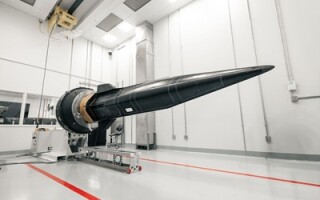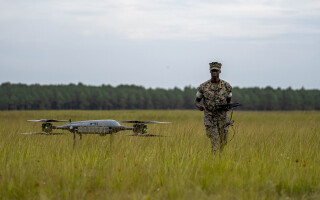CRADA focuses on thermal management of RF applications
NewsApril 26, 2017
CRANE, Ind. Purdue University and Naval Surface Warfare Center, Crane Division (NSWC Crane) representatives entered into a Collaborative Research and Development Agreement (CRADA) to facilitate the exchange of information, as well as the sharing of the capabilities and facilities for developing advanced thermal management techniques for Navy high-power radio frequency (RF) applications.
The agreement aims to develop advanced concept models and prototype RF modules with integrated cooling technologies. NSWC Crane will need to develop such cooling technologies as the Navy progresses toward much higher power and thermal densities within the new systems being developed.
“As product support to these new programs, NSWC Crane must understand the thermal behavior of the lower-level components and relate the behavior to the overall system behavior,” says Brian Olson, NSWC Crane principal investigator.
Emerging systems being developed feature many more high power amplifiers (HPAs) than older ones. HPA power dissipation directly results in heat, which limits the device’s power and life. The Defense Advanced Research Projects Agency’s (DARPA) recent Intra/Interchip Enhanced Cooling (ICECool) Program has aggressively pursued the development of high-heat-flux embedded cooling strategies, including through a project that features Dr. Justin A. Weibel of Purdue University on the team of investigators.
"I’m excited about this opportunity to take some of the fundamental understanding we’ve gained, and work with NSWC Crane to apply these research outcomes to systems of practical relevance to the Navy," says Weibel.
"Dr. Weibel has been an investigator on several projects on high-power, two-phase thermal management techniques, which makes Purdue the perfect partner for us on this agreement," Olson adds. “Dr. Weibel has been conducting research on this topic for nearly 10 years. We are excited to pair his research and scientific expertise with NSWC Crane’s in-depth knowledge of system and subsystem requirements.”

NSWC Crane's Technology Transfer (T2) Program helps link federal research and development to academic institutions and businesses in the private sector. A CRADA provides the formal mechanism between the federal laboratory and partner collaborator. The NSWC Crane T2 program has partnerships with more than 100 businesses, individuals and universities. Currently, there are 37 active CRADAs and 164 active agreements.
Read more on thermal management:
Thermal management critical to military electronics upgrades
Cooling electronics in modern military ground and air platforms must balance reliability and cost




